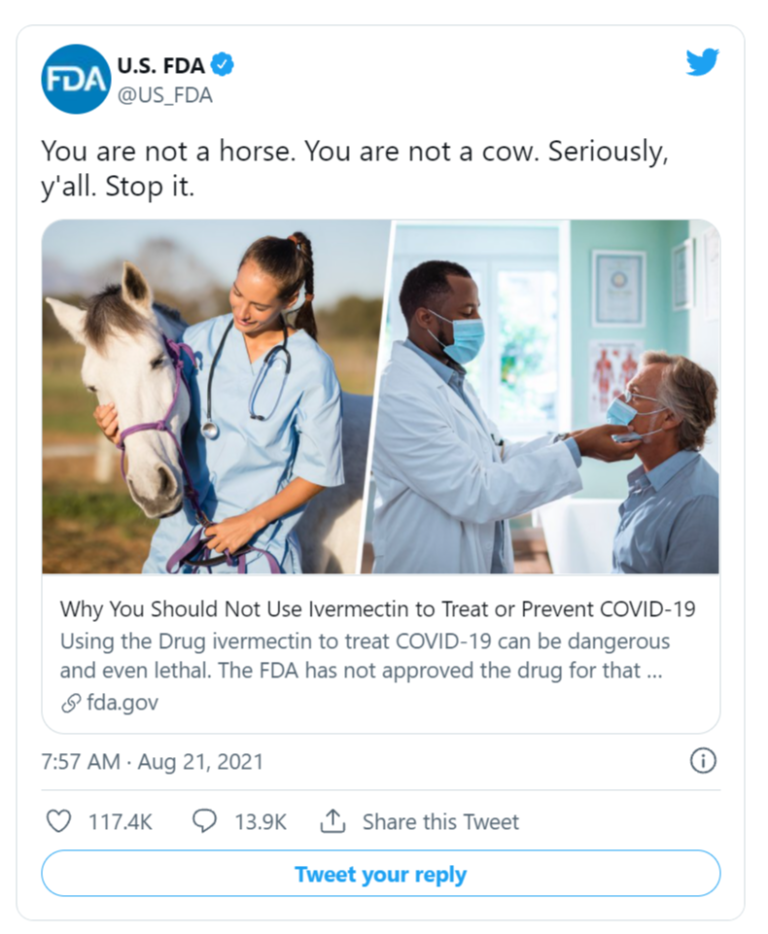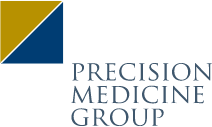Why pandemic-era social media fixes haven’t worked — and could backfire — in the complex case of ivermectin

First published in Digiday.
From authoritative labels reminiscent of warnings on a late ’80s hip-hop CD to arbitrary account removals and ad rules that don’t seem to apply, there’s little evidence that current tech platform fixes are working to stop risky off-label use of ivermectin as a treatment for COVID-19.
And it’s even less clear that proposed legislative reforms, if in place today, would have done much to quell the rise of the latest coronavirus cure praised by vaccine skeptics.
The key hits:
- While its COVID-killing properties have been debunked, ivermectin’s accepted uses for humans complicate combating misinformation about it.
- The rules companies like Google and Facebook have put in place to prevent the spread of ivermectin misinformation and stop companies from monetizing from it have been enforced haphazardly at best.
- Because the biggest social media platforms have attempted to counteract ivermectin misinformation by pointing to the very health agencies many vaccine skeptics question, their approaches may actually reinforce distrust of government authorities, egging on interest even more.
Ivermectin gradually emerged last year as a topic of conversation in anti-vaxxer, natural medicine and right-wing political circles via social media livestreams, videos and other viral content. But it’s not just social media platforms that have buoyed the rise of ivermectin, establishing its credence among its proponents. Hype has been fueled by the appearance of one of its primary cheerleaders, Dr. Pierre Kory — the de facto leader of a group of self-proclaimed “world renowned Critical Care physician/scholars” — at a Senate hearing and on the popular Joe Rogan Experience podcast. And Wall Street Journal opinion pieces have questioned the failure of federal health agencies to take advantage of ivermectin’s questionable effects for treating COVID.
Prescribed and distributed legally around the world for years, it is commonly used for veterinary purposes as a dewormer for livestock or small pets, prompting several reports highlighting its equine uses while downplaying its longtime sometimes-lifesaving use for humans. But currently there is no conclusive research that shows ivermectin works to reduce the harms of COVID-19, and off-label use of the drug could have harmful side effects.
“The case of ivermectin should probably not come as a surprise as it repeats a pattern we saw earlier with hydroxychloroquine,” said Katherine Ognyanova, associate professor at the School of Communication and Information at Rutgers University and co-lead of the COVID States Project, a joint research initiative of Northeastern University, Harvard University, Rutgers University and Northwestern University. “Experts are recommending that they not be used to treat COVID, while public figures with no medical training are promoting their use. So this is not a new scenario; we have seen this type of public health threat before. Even so, we may not be as well prepared to deal with it as we should be,” she said.
Why the ivermectin issue isn’t a simple misinformation problem
Cautionary labels abound on posts about ivermectin. When Joe Rogan was trending in relation to ivermectin recently on Twitter, the right panel of the site included a notice citing the Food and Drug Administration, stating that ivermectin is not an authorized for treatment for COVID-19.
A YouTube video from 2020 featuring an interview with Kory regarding “Emerging Evidence For Use of Ivermectin in the Prophylaxis and Treatment of COVID,” is labeled with a notice about COVID-19 facts from the CDC, which links to the agency’s page proclaiming, “Get Vaccinated!”
Facebook points to its use of labels that link to what it considers legitimate COVID information. When Dr. Simone Gold — a public face of anti-vaccine group America’s Frontline Doctors and another prominent proponent of both hydroxychloroquine and ivermectin — has posted about topics such as vaccine side-effects and coronavirus treatments on Facebook, those posts have been marked with notices referencing the safety of COVID-19 vaccines, citing the World Health Organization. Facebook said it has labeled more than 190 million pieces of COVID content rated by its fact-checking partners.
Along with Merck, an ivermectin manufacturer, the FDA and Centers for Disease Control have warned against its use to treat COVID-19. The WHO has cautioned against using it to treat coronavirus outside of clinical trials, and the National Institutes of Health said the jury is still out on its effectiveness as a COVID-19 treatment. Meanwhile, poison control centers across the U.S. recently have reported increases in overdoses and people experiencing adverse effects from using the drug off-label as a supplement to or even a replacement for to the vaccine.
But ivermectin is recognized by government health authorities as a safe treatment for human parasitic infections such as River Blindness. And although believers in ivermectin’s COVID-killing properties have cited now-debunked studies in support of their theories, research of ivermectin as a possible COVID-19 treatment is underway today at Oxford University.
It’s those nuances that lie in the cracks between outright false claims and curiosity or genuine discussions about the need for more robust studies for ivermectin’s use as a low-cost COVID treatment that plague social media content moderation algorithms and human monitors.
“Drawing the line between potentially harmful claims about ivermectin versus what could be a beneficial discussion is really hard,” said Scott Babwah Brennen, a senior policy associate at the Center on Science and Technology Policy at Duke University. “This isn’t people drinking bleach; there is at least some reason to discuss it, so moderating content is really difficult and it isn’t as clear cut as other examples of misinformation,” he said. Still, he emphasized that he thinks social media platforms should be held accountable for contributing to the spread of misinformation even when it comes to complex topics like ivermectin.
Another risk: reinforcing distrust
Ultimately, marking information with notices citing public health authorities might backfire, actually reinforcing distrust in the vaccines and, in turn, solidifying support for unproven treatments such as ivermectin. “One of the key factors at play here is trust in institutions,” said Ognyanova. “Americans who do not trust the government, mainstream media and the healthcare industry are more likely to be vaccine-resistant, more likely to believe health misinformation and to ignore warnings by medical experts,” she said.
When Facebook, Google and Twitter remove posts and hashtags or slap a warning label on them, it actually has a counterintuitive effect, said Isaac Simpson, associate creative director at PrecisionEffect, a branding and marketing agency that runs social media influencer campaigns for emerging medical tech clients. “The more alienated these influencers become from the mainstream, the more they’re censored by the Googles and Facebooks,” he said.
And, because the fundamental basis behind efforts to promote ivermectin as a COVID-19 treatment “is the theory that a global medical establishment is pushing for widespread usage of the vaccine, both for the purposes of control and profit,” said Simpson, “This censorship actually helps to make their message even more digestible and convincing to the vaccine skeptic, even if the message itself is invalid or unsupported by evidence,” he said. “The more ‘authority’ used to debunk it or question it, often the stronger it becomes.”
That apparent disconnect may have been exacerbated by an FDA tweet in late August that not only failed to take people who are curious about ivermectin seriously, it demeaned their intelligence, suggesting that they don’t know the difference between ivermectin for human use and the stuff for livestock that comes in a tube and is sold at farm supply stores. “You are not a horse. You are not a cow. Seriously, y’all. Stop it,” quipped the tweet, which featured an image of a vet with a horse.
“This doesn’t exactly address the informational divide, or the humans on one side of it, with respect or understanding,” said Simpson. “Rather, to me, it feels like it’s mocking them and will likely only make vaccine skeptics all the more certain about their reactive position,” he said. He argued that “What’s needed are more influencer voices that can acknowledge the gap, take it seriously, and de-escalate the culture war through respectful recognition of the uncertainty of an unprecedented pandemic situation, rather than insisting on aggressive certainty.”
How ivermectin rose to fame inside — and outside — social media
A report finding that just 12 people are responsible for nearly two-thirds of anti-vaccine content percolating through social platforms prompted members of Congress to call for the removal of those so-called “disinformation dozen” from Facebook and Twitter. The thing is, some people on that list do not appear to have pushed ivermectin, according to a Digiday analysis of the dozen’s social media posts. But perhaps more notably — ivermectin pushers including Kory, Gold and Rogan — are not on that list. Thus, merely removing those dozen accounts may not have affected the gradual spread of pro-ivermectin messaging.
Kory’s testimony at a Senate Homeland Security Committee hearing in December 2020 helped launch the slow-drip discussion around the drug. His message and that of the other “physician/scholars” in his Front Line COVID-19 Critical Care Alliance collective revolves around a cocktail of treatments for managing hospitalized COVID patients. Their so-called I-MASK+ Protocol calls for daily immune-system-boosting doses of Vitamin D, zinc and weekly dosing of ivermectin as preventative measures intended to stave off COVID-19.
The chair of that Senate committee, Wisconsin Republican Sen. Ron Johnson co-wrote an opinion piece published in the print and online editions of The Wall Street Journal this April touting the safety records of ivermectin and hydroxychloroquine — another drug the FDA has warned against as a COVID treatment — arguing that federal agencies should devote their efforts to confirming results of research involving repurposed drugs “instead of chasing new, more expensive drugs.” The WSJ in July ran another opinion piece purporting the promise of ivermectin as a COVID treatment co-written by a Stanford University research fellow and pharma industry consultant titled, “Why Is the FDA Attacking a Safe, Effective Drug?”
Talk of ivermectin also has been propelled by entities that, though fueled by social media, exist outside it. A livestreamed “World Ivermectin Day” event in July drew thousands of viewers to watch speakers from across the globe, including Kory.
Yet Rogan has done much to move the topic deeper into the cultural zeitgeist. He had Kory along with another ivermectin backer, evolutionary theorist Bret Weinstein, on his show in June. In part because of their influence, he took ivermectin recently to treat the virus when he contracted it, telling his podcast audience that he thinks it helped him recover. “CNN was saying that ‘I’m a distributor of misinformation,’” he said during the Sept. 7 episode of his show, wondering aloud if he should sue the media giant. “They’re trying to make it seem as if, like, I’m doing some wacky shit that’s completely ineffective.”
Google and Facebook are not reining in ivermectin ads
That hype from the contrarian hero may have had a significant impact on interest in the drug. Rogan told his audience on Sept. 2 that he had tested positive for COVID-19 and was taking ivermectin. That same week, Google search queries for the term “ivermectin” peaked, according to Google search trends data, hitting a high point between Aug. 29 and Sept. 4, after rising steadily since July 4.
And, despite efforts to tamp down phony ivermectin claims on YouTube and Facebook, that boost in interest in the drug has generated ad revenue for Google and Facebook. Indeed, the two largest digital ad sellers are not only collecting ad dollars from increased interest in ivermectin, they are making it easy for people to get a prescription for its off-label use.
- A simple Google search for keywords such as “ivermectin prescription” results in paid ads, including one from Push Health, which has advertised its service to “Request an ivermectin prescription online and get ivermectin medication near you” since at least August 15, according to multiple Google ivermectin-related searches conducted by Digiday.
- On Facebook, ads from telehealth platform Seven Cells specifically promote its sales of ivermectin. But there’s a nuance in the language that seem to help them skirt Facebook’s rules. Though the ads mention the drug by name, they merely note that, “Ivermectin is being studied as an effective supplement to help combat certain viral infections and reducing symptoms related to C-19,” and encourage people to “Get treatment today!”
- Those SevenCells ads have run on Facebook since August 27 and were still up on September 10 as this story was being reported. The SevenCells.com homepage features a special notice promoting ivermectin which links to a product page where a bottle of 20 capsules costs $165. Because the drug is in such high demand, states the page, “Pricing for raw materials continue to go up.”
- Amazon also is running Google search ads linking to its online pharmacy homepage when people search for “ivermectin prescription,” though those ads do not promote ivermectin by name. And, like a warning on a pack of smokes, when people search for ivermectin in the Amazon Pharmacy, it turns up a page featuring a warning label at the top: “The FDA advises against the use of ivermectin to treat or prevent COVID-19.”
Google and Facebook do have advertising rules in place that address ivermectin in particular. When asked whether it has rules regarding ivermectin advertising or content, Google told Digiday its advertising policies prohibit ads that promote harmful health claims, or content that relates to a current, major health crisis and contradicts authoritative scientific consensus, including claims promoting unapproved treatments or cures for Covid-19 such as ivermectin.
The company also said it removes content that recommends the use of Ivermectin for the treatment or prevention of COVID-19, or content that categorically claims Ivermectin is an effective treatment for the virus, though it may make exceptions, for instance, when content mentions ivermectin in the context of clinical trials.
And despite the SevenCells ads running on its platform, Facebook told Digiday it removes content that attempts to buy, sell, donate or ask for ivermectin and said it does not allow ads promoting ivermectin as a treatment for COVID-19.
Flaws of legislative fixes
Some lawmakers believe government intervention is the right prescription for curing the ills of COVID-related misinformation. Sen. Amy Klobuchar, a Minnesota Democrat and vocal critic of the increasing power of the big tech platforms, along with Sen. Ben Ray Luján, a Democrat from New Mexico, in April asked Facebook and Twitter to remove the accounts of the disinformation dozen, even while people who weren’t on that list including Kory and Gold were promoting ivermectin as a possible vaccine alternative.
The two legislators in July co-sponsored the Health Misinformation Act, a bill that would remove the legal protections afforded to the tech platforms by Section 230 of the Communications Decency Act during a public health emergency. If passed, it would hold them liable when their algorithms facilitate the spread of health misinformation — as defined by the Secretary of Health and Human Services, relevant federal agencies and outside experts.
But it’s just not clear that such a reform would have altered the trajectory of the rise of ivermectin, said Cathy Gellis, an independent San Francisco-based internet lawyer who has opposed other proposed alterations to Section 230 intended to assuage societal problems amplified by social media platforms. In fact, she said it could have forced even more promotion of the still-questionable treatment.
“Sen. Klobuchar’s bill is designed to empower [the White House] to decide which are the favored messages, but that means if this law had been in effect during the last administration, that administration could just as easily have decided to condition social media platforms’ Section 230 protection on facilitating only the pro-ivermectin messages and suppressing the anti-ivermectin messages,” she told Digiday. “In other words, rather than serving public health, this bill itself could cause it to be undermined.”











